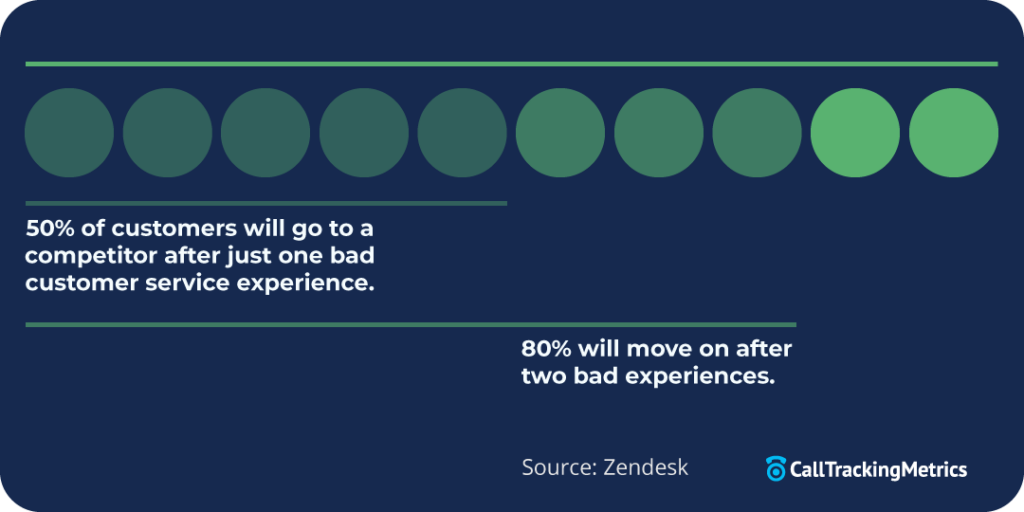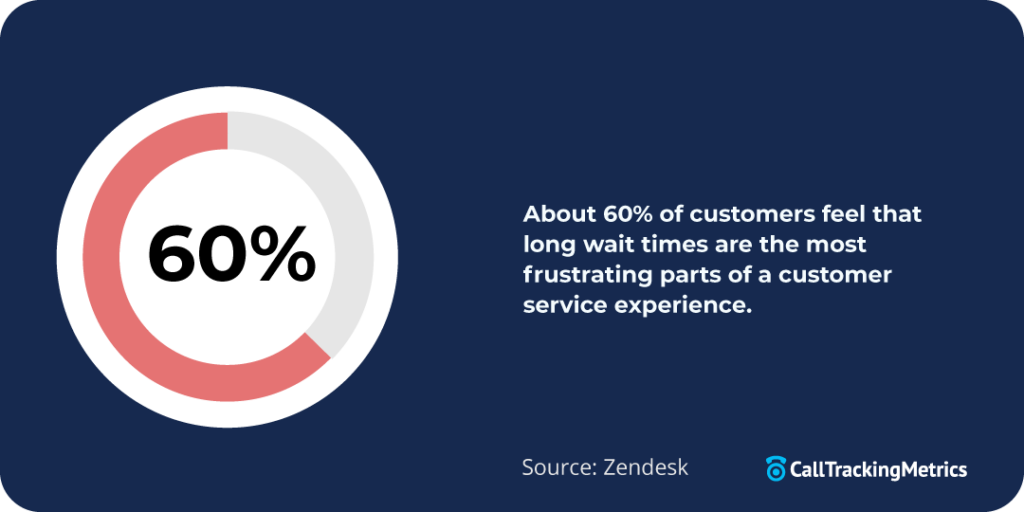Virtual Agents: 7 Ways to Improve Productivity and Efficiency
Technology plays a crucial role in helping companies to streamline processes and provide a better, more personalized customer experience. Organizations that implement technology, like virtual agents and call management tools, save time, improve efficiency, and have happier customers.
And in today’s competitive landscape keeping customers happy is vital. In fact, according to Zendesk, 50% of customers will go to a competitor after just one bad customer service experience. What’s more, 80% move on after only two bad experiences.

So just what is a virtual agent and how can it help organizations surpass revenue goals and nurture loyal, happy customers?
A virtual agent is a software program that often uses artificial intelligence (AI) and follows scripted rules to provide answers, guidance, and more for customers and prospects. Essentially, a virtual agent performs routine tasks that are tedious and time-consuming for human agents. Most commonly used in customer service-type roles, a virtual agent can do basic tasks like:
- Address customer queries
- Schedule appointments
- Ask relevant questions
- Provide directions on basic IT tasks
- Qualify leads
Being able to quickly engage with customers and effectively solve their problems are essential parts of providing an exceptional customer experience. And the customer’s experience with your company is critical. According to Microsoft, 90% of Americans base whether or not they will do business with a company on the customer service they receive.
Marketing automation tools like virtual agents help organizations provide better customer service. They are able to fill in customer service gaps so customers get the support they need quickly. The specific tasks virtual agents can perform are based on how complex the rule set is and if the software is powered by AI. But before we get into how virtual agents work let’s look at what they are and what they aren’t.
What is a Virtual Agent?
There are a few terms that often get confused and are similar to virtual agents. Virtual agent and virtual assistant are two terms commonly confused. A virtual agent is not the same as a virtual assistant. A virtual assistant isn’t software at all, it is an individual who performs tasks for someone else but works remotely or virtually.
Another term that is sometimes confused with virtual agent is chatbot. And while chatbots and virtual agents have many similarities, they are not the same. A chatbot, like a virtual agent, provides customers and website visitors with instant support and engagement, however, a chatbot is limited in the level of customer service support it can provide.
The main differences between a virtual agent and a chatbot are not only in the level of support provided but also in the type of experience that’s provided. A virtual agent powered by AI provides a more human and personalized experience and is able to handle more complex customer service needs. However, the line between the two continues to blur more and more.
There are also different types of virtual agents. If you’re considering using virtual agents, it’s important to take a look at what each can and can’t do.

3 Types of Virtual Agents for Business
The term ‘virtual agent’ is used in different ways by different people. How one person or organization uses and defines it and how another person or company does can vary. We will be looking at three different types.
- Virtual agents (Basic IVR)
As mentioned, a virtual agent is a software platform that follows a set of predefined rules to provide basic customer service functions. This is the least ‘intelligent’ type of virtual agent and centers around keypad presses to navigate menus.
An example is when you call your favorite restaurant and are prompted to ‘press one’ for take out, etc.
- Virtual voice agents (Voice Bots)
A virtual voice agent, also sometimes called Voice Bot, uses AI to enable a customer to use the spoken word to navigate customer service interactions. With voice bots when a customer calls in they don’t have to navigate menus with keypads. This type is preprogrammed to recognize certain keywords, often used in conjunction with IVR, and adds voice recognition to the mix.
Virtual voice agents work with interactive voice response (IVR) systems to deliver streamlined customer service.
An example is when you call your doctor’s office and the virtual voice agent asks, ‘Are you a doctor or a patient? Depending on your answer, you are then routed to either the next menu or the agent best suited to meet the caller’s needs.
- Intelligent virtual agents (IVA)
Intelligent virtual agents use customized rule sets along with AI to model human interactions and conversations. IVAs are also able to understand user intent- a key component in delivering the right type of service. IVAs can interact with customers through voice, text, chat, or email. In addition, there are visual, animated IVAs.
IVAs are the most advanced type and offer a wealth of benefits for companies and consumers alike. The tasks that can be performed comes down to the presence of AI capabilities as well as the rule set programmed. The tasks can be as complex as the rule sets created.
An example is, contacting a bicycle repair shop online for a tire repair. The IVA is able to identify customer intent to schedule an appointment, and, through a series of questions can schedule the correct type of appointment, at a time the caller indicates works best, for the type of bike being repaired.
CallTrackingMetrics’ AskAI powered by ChatGPT, takes this even further. This advanced tool, enables teams to create customized questions to get information–automatically–after the call. The questions are programmed in and when the call is completed AskAI immediately answers the preset questions (that you select and customize). What’s more, follow up tasks can be automated based on the answers from AskAI.
Types of questions AskAI powered by ChatGPT answers:
- Was this a good or bad call?
- What was the tone of the call?
- Was the customer satisfied?
- What was the sentiment of this call?
- Summarize the conversation in two sentences.
- Much more!
In addition, with AskAI powered by ChatGPT, teams benefit from immediate lead qualification. This means your team can be the first to know a lead is hot and follow up instantly. Follow up time is key to winning a sale. AskAI capabilities powers up both sales and marketing teams with the right information, at the right time.

How Do They Work?
The technologies for virtual agents began to take shape in the early 2000s. At this stage, these agents would respond to keywords they were programmed to recognize. When a certain keyword was spotted in the conversation then a preprogrammed response related to that keyword would be automatically sent.
In these early models, workflows based on keywords were mapped out along with scripted agent responses. These scripts allowed virtual agents to handle the most basic queries that could be answered with a predictable response.
However, in the mid-2000s, the addition of machine learning, natural language processing (NLP), and artificial intelligence (AI) began to take these agents to a whole new level. With these new technologies, intelligent virtual agents, as they’re also called, are now able to support more complex tasks and take it a step further by personalizing the customer’s experience and understanding customer intent. Both are essential in today’s customer service world.
Today, virtual agents who deliver the most robust services, understand customer intent, and respond with personalization to queries are built on complex rules and AI. What’s more, is that intelligent virtual agents even know when it’s time to hand off the queries to a human agent. They offer great value and essential benefits to not only the organization but also to the customer being served. It’s a win-win for everyone!
More and more organizations realize the importance of using AI-powered virtual agents. According to PWC, leaders who implement AI quickly see increased productivity.
7 Benefits of Using Virtual Agents (Beyond the Obvious)
Increasing both productivity and efficiency are key benefits of virtual agents. However, it’s important to understand what these agents can do and how it actually improves productivity, efficiency, and–your bottom line.
- Understand Customer Intent
When teams understand a customer’s intent, they are better able to respond in the most helpful ways to meet the customers’ needs and solve their problems. Understanding customer intent unlocks the door to delivering the right message, at the right time to drive conversions and revenue all while providing a timely, personalized experience. Using automation tools in conjunction with marketing attribution tools improves communications and strengthens connections.
- Communicate On Multiple Channels
Virtual agents aren’t limited to just one or two channels of communication. Many are able to effectively provide customer service on the following channels:
- Phone
- Chat
- Text
This enables customers to interact with your brand when and where it’s most convenient for them. Having virtual agents on these channels increases consistency in the customer experience. Virtual agents make it easier to create an immersive, branded omnichannel communications experience for customers.
In addition, some platforms integrate with other platforms like Microsoft Teams, Facebook, and Slack offering even more ways to conveniently connect with customers.
- Provide Round the Clock Customer Service
Meeting customers and prospects when it’s best for them is vital in today’s competitive market. With virtual agents, teams can provide 24/7 customer services on a number of channels. No more lost sales because no one was available in the late night hours.
- Provide Fast, Consistent, and Compliant Responses
There’s nothing worse than waiting forever in a queue for the next available agent. Today’s customer wants good service and they want it fast. Virtual agents enable teams to deliver faster responses to customers. And that quick response time goes a long way in customer service.
Consistency and compliance are huge today. As a result of virtual agents being built on rule sets, the communications are always consistent and on brand. What’s more, virtual agents follow a specific rule set which means they also stay within regulations and compliances.
- Manage Multiple Chats at Once
Another benefit that impacts not only revenue but also labor costs is the ability of virtual agents to handle multiple conversations at the same time. This enables more customers to get what they need in shorter periods of time all without hiring more employees. This also helps the employees you have to be more productive and happier.
- Reduce Agent Workload And Stress
Stress at work is a big issue in the workplace today. With decreased workforce sizes employees are asked to take on more tasks all too often. This can lead to burnout and poor performance. Virtual agents help to reduce workloads and stress so employees are fresh, relaxed, and able to perform at their maximum potential. This means better results for organizations and better customer experiences.
- Improve Customer Experience
Each of the items discussed above leads to an improved–and often exceptional–customer experience. When customers get the information they need quickly, in the format they want, on the channels where they spend time, it makes for a great customer experience.
Virtual agents can add a lot of value to organizations that handle a lot of customer service queries. From scheduling appointments to resetting passwords and even helping with plan sign-ups, virtual agents powered by AI can help teams to do more with less and consistently drive revenue.
And while these benefits and features are impressive, they also help organizations with hitting their KPIs and goals. Virtual agents help teams:
- Shorten sales cycle
- Lower support manpower costs
- Increase conversion rates
- Improve customer retention
- Drive more leads
All vital to do in order to achieve sustainable business results no matter what industry you’re in today. However, there are some industries that need to use virtual agents or they face being left behind by competitors.
Read on to take a look at which industries rely most on virtual agents.
5 Industries that Need Virtual Agents Today
- Retail and eCommerce
The boom of eCommerce and its continued growth is undeniable. The eCommerce industry is projected to reach $6 trillion in sales by 2024. This industry needs to be able to keep up–and scale–with the growing demands.
Virtual agents are a natural solution in eCommerce. From fulfilling order requests to answering questions about returns or problems with products, virtual agents in eCommerce can save organizations from higher labor costs and frustrated customers.
- Healthcare
Medical professionals today are overworked and need all the support they can get. Reducing workload and stress in this industry also leads to improved patient experiences and outcomes–all important results.
Virtual agents can be used in a variety of ways in this industry from appointment scheduling and reminders to fast communication between medical teams leading to healthier and happier patients.
- Human Resources
Human resource teams can make the difference between retaining your talented employees or losing them consistently. When human resources teams are overwhelmed, everyone suffers.
Often, human resource teams spend nearly half of their time on recruiting and associated tasks. This leaves little time for focusing on strategy, development, training, and more. Virtual agents can provide support for these traditionally busy teams in varied ways.
Not only can they help with answers to common employee queries, but they can also play vital roles in the screening and hiring process. From detecting interest levels and candidate qualifications to background checks and more, virtual agents can help support numerous tasks in HR departments giving back staff more time to focus on what really helps to drive the bottom line and improve company culture.

- Travel and Hospitality
Data shows that the travel and hospitality industries are making big comebacks these days. In fact, according to research, the market for online travel was worth $354 billion in 2021 and is projected to grow to $1,835+ billion by 2028.
In addition to a rising volume, more people today are traveling internationally than ever before. However, with this global travel economy comes the need for 24/7 customer service for those individuals in different countries and time zones.
If a travel or hospitality company is unable to be available beyond their local time and asks prospective customers to come back during business hours, sales will be lost in droves. After all, today, you can book travel to anywhere in the world at any time of the day no matter where you are if you have internet access. Virtual agents provide critical assistance to these industries by providing round-the-clock access to support.
- Real Estate
Real estate is an ever-changing industry. Agents and teams need to keep up with these changes and keep their clients and prospects updated too. This is another industry where visitors often visit after typical ‘office hours’. Being able to provide personalized, up-to-date, valuable information whenever your client asks is crucial in this competitive industry.
Virtual agents do just that. They can provide information on specific homes, and neighborhoods, and even schedule appointments with agents or share open house schedules. Not only does this provide instant engagement with visitors, it also frees up agents to focus on high-priority tasks.
This list of industries where virtual agents are a great fit is far from exhaustive. As mentioned, just about any industry that provides a certain volume of customer support and service will find value in implementing virtual agents. Some other industries to mention where virtual agents are a natural fit include:
- Banking and Finance
- FoodTech
- EdTech
- Automotive
- Logistics
As mentioned, numerous industries benefit from using virtual agents, and this trend is set to continue. Engaging faster with customers, understanding quickly and accurately what they want, and personalizing service around the clock are just a few of the benefits of this ever-emerging technology. Organizations can look forward to easily scaling without increasing labor costs, with better productivity, and stress reduction for human agents and teams.
To learn more about using automation and virtual agents to improve productivity and increase your bottom line, check out highlights from our webinar with Lice Clinics of America to see how automation helped them to streamline processes like appointment booking and more.
Want to see how CTM’s automation can help your team? Book a Demo
